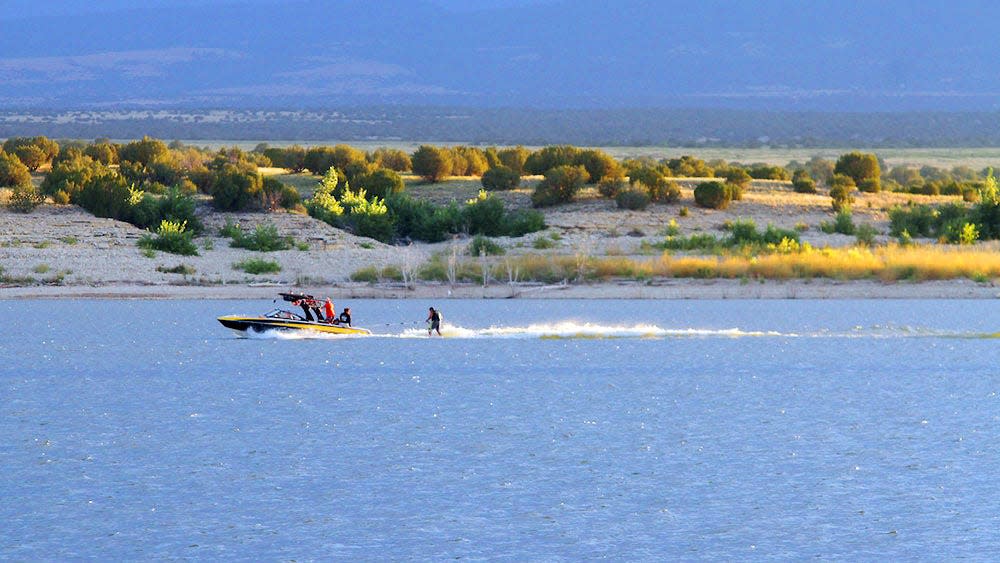Here's what you need to know about water safety after Lake Pueblo, Arkansas River deaths

The death of 16-year-old David Marez at Lake Pueblo came eight days after a Fort Carson soldier and his wife died at the reservoir after the boat they were on with 11 other people capsized in high winds.
Colorado Parks and Wildlife recommends following these tips to stay safe in and on the water:
All recreationists
Check the weather before heading out on the water. High winds are of particular concern in Pueblo.
Don't consume alcohol before swimming or boating.
The water in Lake Pueblo and other waterways in Colorado state parks is cold. Entering cold water suddenly can cause cold shock, where your heart has to work harder and your blood pressure goes up. This can lead to heart attacks, even in the relatively young and healthy. Staying in cold water for a prolonged period can cause hypothermia.
Enjoy your swim but know the risks
The first safety tip for swimmers from CPW is an obvious one: make sure you know how to swim before visiting a swim area. There are no lifeguards at Colorado State Park beaches, including the swim beach at Lake Pueblo, so swimming is at your own risk.
Wear a life jacket/personal floatation device if you are not a strong swimmer or you are getting tired. Some parks lend out life vests for free.
Never swim alone. The most experienced swimmers can get tired and experience cramping.
Swim in designated swimming areas only. These have been selected by park staff as the safest and best places for swimming.
Supervise children aged 12 and under at all times.
Attend a 'Boating Safely in Colorado' course
Anyone operating a motorboat, including a personal watercraft or sailboat in Colorado must be at least 16 years old, although 14- and 15-year-olds who have successfully completed a state-approved boating safety course, such as Boating Safely, can operate a motorboat, jet ski, or sailboat in Colorado.
The next course in Pueblo will be offered June 13 and is open to adults and teens aged 14 and older. Register at least a week ahead of the course at www.register-ed.com/events/view/177677.
Attendees must purchase and study a 60-page manual prior to the course. The manual costs $4.99 and is available at bookstore.kalkomey.com/products/boat-colorado-boating-safely-in-colorado. Hard copies can be ordered by calling 303-291-7575 or emailing boating.safety@state.co.us. Students must score at least 70% on a written test at the end of the course to receive a boater ID card.
About the accident: Body of 2nd victim of Lake Pueblo boat capsize recovered, identified
Check your equipment
All boats must be equipped with enough life vests for every person on board and anyone who is towed behind the boat, such as a water skier. Life vests, also called personal flotation devices, or PFDs, must be U.S. Coast Guard-approved. Larger boats must also have a PFD that can be thrown into the water. Life vests must be the correct size for all passengers.
A list of other required equipment and regulations that must be met on recreational boats is available in CPW's 2022 Boating Handbook with Regulations and Statute.
Get a safety inspection on your vessel
Different types of boat have different requirements, and these are outlined on CPW's boat safety webpage — cpw.state.co.us/learn/Pages/BoatingSafetyInspections.aspx. Safety inspections can be requested at any time and courtesy inspections are frequently conducted at boat ramps. Inspections help ensure that time spent on the water is safe and enjoyable, CPW says.
Review navigation techniques
Navigating on water is not the same as driving a car. CPW's "Rules of Waterways" is available online at cpw.state.co.us/Documents/Boating/navigation.pdf. The complete list of boating rules is in section 219 of the Boating Handbook.
Know what to do in the event of an accident
This is similar to what you must do after a road traffic accident:
Stop at the scene and assist others if you can do so safely. This is required by law.
Don't risk lives to save equipment. Call for help.
Boat operators involved in an accident with another vessel must exchange names, addresses, vessel IDs and the name of the owner, if different from the operator.
File an accident report using this form: cpw.state.co.us/Documents/Boating/BoatingAccidentReportForn.pdf.
Where to get more information
CPW's boating safety page: cpw.state.co.us/learn/Pages/BoatingSafety.aspx
The Safe Boating Campaign website: safeboatingcampaign.com/
This article originally appeared on The Pueblo Chieftain: What you need to know about water safety after Colorado deaths

